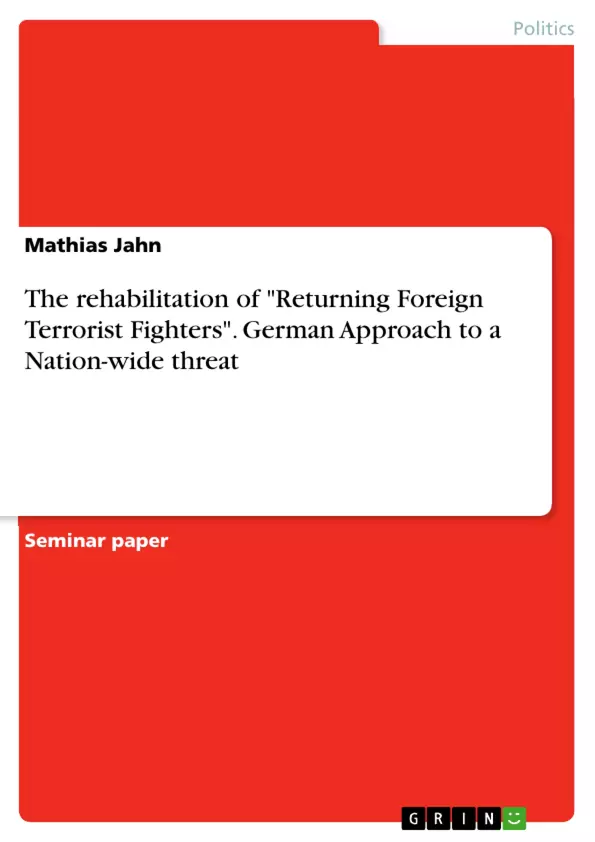Under the assumption that radicalized RFTF’s had the assignment, skillset, and intention to seek opportunities to recruit and carry out terrorist attacks for the IS and, therefore, would impose a significant threat to national security, there should be a strategy to cope with this problem. This paper wants to analyse the approach to this issue in Germany, especially since they don't seem to have a comprehensive strategy to this day.
Between 2011 and 2015, as a result of the violent conflict in Syria/ Iraq, U.S. and German intelligence reports estimated volunteers traveling to the conflict zone up to 36.500 stemming from 100 countries (thereof 960 Muslim men/ women from Germany = DEU). Their aim was to support the Islamic State (IS) and to take part in its war-fighting/ terrorist attack efforts. By 2019, 30% of the German fighters have returned, 103 were sentenced/ detained including “at least 80” with “military training” of whom 34 will be released in 2023. In anticipation of a future inbound flow of these combatants back to their homeland, the U.N. Security Council resolution 2178 called in 2014 all “Member States” to develop/ implement “rehabilitation and reintegration strategies for returning foreign terrorist fighters” (RFTF).
Inhaltsverzeichnis (Table of Contents)
- INTRODUCTION
- RESEARCH RESULTS FOR SUCCESSFUL REHABILITATION
- Theoretical Considerations
- Good Practice Tenets
- GERMANY's REHABILITATION APPROACH ASSESSED
- Threats & Opportunities
- Weaknesses & Strengths
- POLICY RECOMMENDATIONS
- Tactical measures
- Operational-strategic initiatives
- CONCLUSION
Zielsetzung und Themenschwerpunkte (Objectives and Key Themes)
This paper aims to examine the effectiveness of Germany’s rehabilitation approach for returning foreign terrorist fighters (RFTF) and propose policy recommendations to enhance its efficacy. The study focuses on the challenges posed by the influx of RFTF, especially those with military training, and explores practical measures to manage these individuals upon their release.
- Successful rehabilitation strategies for RFTFs
- The German rehabilitation approach and its strengths and weaknesses
- Policy recommendations for enhancing rehabilitation effectiveness
- The role of religious rehabilitation in deradicalization efforts
- The need for a comprehensive national strategy for managing RFTFs
Zusammenfassung der Kapitel (Chapter Summaries)
- Introduction: This chapter introduces the background of returning foreign terrorist fighters (RFTF) in Germany, highlights the growing threat posed by their potential return, and outlines the research questions guiding the paper. It also emphasizes the current lack of a comprehensive national strategy for managing this issue.
- Research Results for Successful Rehabilitation: This chapter delves into the theoretical and practical considerations for designing an effective rehabilitation strategy. It examines relevant academic research, including the significance quest theory, and discusses the good practices outlined in the "Rome Memorandum" for successfully rehabilitating and reintegrating extremists.
- Germany’s Rehabilitation Approach Assessed: This chapter analyzes the German rehabilitation approach, outlining its strengths and weaknesses. It explores the challenges and opportunities associated with this approach, considering factors such as the threat posed by RFTFs and the potential for successful reintegration.
- Policy Recommendations: This chapter provides concrete policy recommendations for enhancing the effectiveness of Germany’s rehabilitation approach. It proposes both tactical measures and operational-strategic initiatives, aiming to address the challenges identified in the previous chapters.
Schlüsselwörter (Keywords)
The main keywords and focus topics of this text include returning foreign terrorist fighters (RFTF), rehabilitation, deradicalization, extremism, terrorism, intelligence, homeland security, Germany, policy recommendations, religious rehabilitation, operational-strategic initiatives, and the “Rome Memorandum”.
Frequently Asked Questions
What are "Returning Foreign Terrorist Fighters" (RFTF)?
RFTFs are individuals who traveled to conflict zones (like Syria or Iraq) to join terrorist groups like ISIS and have since returned to their home countries.
How does Germany handle the threat of returning fighters?
Germany uses a mix of judicial sentencing, intelligence monitoring, and rehabilitation programs, though the paper argues that a comprehensive national strategy is still lacking.
What is the "Rome Memorandum"?
It is a set of good practices for the rehabilitation and reintegration of violent extremists, which serves as a benchmark for assessing national approaches.
What role does religious rehabilitation play?
Religious rehabilitation aims to challenge radical ideologies through theological counter-narratives and is a key component of deradicalization efforts.
What are the main weaknesses of the German approach?
The paper identifies a lack of coordination between federal and state levels and the challenge of managing highly radicalized individuals with military training upon their release from prison.
- Quote paper
- Mathias Jahn (Author), 2023, The rehabilitation of "Returning Foreign Terrorist Fighters". German Approach to a Nation-wide threat, Munich, GRIN Verlag, https://www.hausarbeiten.de/document/1336029


